Existing User Log In
New User Registration
Register for a free account to gain full access to the VGChartz Network and join our thriving community.



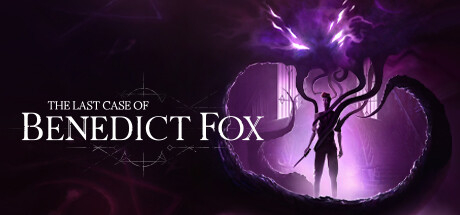

America - Front
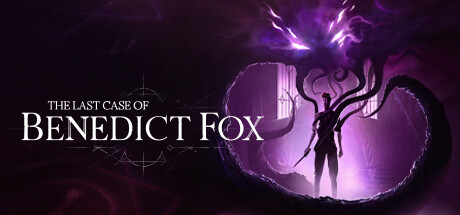

America - Back

Plot Twist
Action-Adventure
 (Add Date)
(Add Date) (Add Date)
(Add Date) (Add Date)
(Add Date)
| Owners: | 0 |
| Favorite: | 0 |
| Tracked: | 0 |
| Wishlist: | 0 |
| Now Playing: | 0 |
It's funny when the concept behind an otherwise well-worn genre can sound refreshing by itself. It's not often you hear about a detective game within the framework of a classic 2D Metroidvania; and yet, said template is about solving a grand mystery of sorts: parsing out clues you don't initially understand, investigating leads, and so on. Despite the inspired ties between premise and genre, Plot Twist's latest runs the gamut of two extreme polarities: exacerbating my impatience over certain gameplay elements whilst heightening my appreciation for its art design.
Against the rules of a secretive occult sect, Benedict Fox's sleuthing finally pays off with the whereabouts of his long-lost father, James Floyd. Upon entry, his large mansion seems dead and empty, but only the former is true upon discovering his dad's corpse in the cellar. Despite seemingly dying of blunt trauma, there are no physical signs of a struggle. Thanks to the uniquely-forged connection with a demon, known as The Companion, Benedict dives into Limbo to uncover James' lasting memories and what ultimately led to his demise. Eldritch Inception eventually expands to James' second wife, Marie, adding to the mystery of what caused their deaths, along with the grander conspiracy involving the occult order.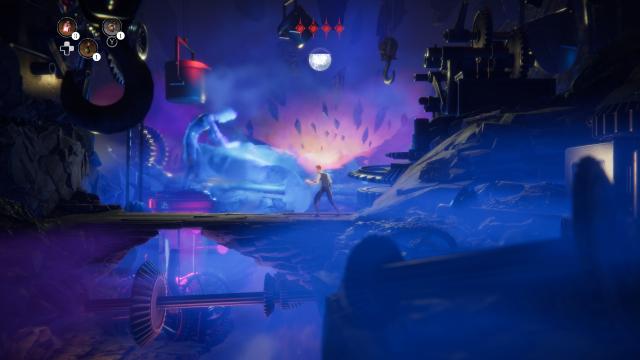
The main basis of Last Case as a Metroidvania is infusing exploration, puzzle-solving, and combat within a Lovecraftian context. One particularly strange way that's translated here is Benedict's lack of a traditional double-jump. After a short portion of standard jumps, a few fights, and so on, he regains the ability but not in the way you'd think. His corrupted double-jump is reliant on proximity to a ceiling or ledge to work (indicated by a semi-transparent purple dot); when it does, The Companion's magical tendrils burst out of its host and grapple you towards that direction. Those times when you can't (flat floor and the ceiling is too high) give a heightened sense of vulnerability. A thematically deliberate choice connected with its main inspiration, but also an aggressively obnoxious one overall.
Also subject to foul experimentation and corruption is the combat. Although my natural reflex when selecting a difficulty is Inverse Game Journo Mode (Hard), Last Case is that unique scenario where I quickly reverted back to Default. It's one thing for early mobs to surprise and end me (e.g. Dark Souls' opening), but here I reached the first boss and started feeling that pit in my stomach growing larger. It was becoming apparent that challenge didn't stem from intricate systems but instead cheap tricks and spongy enemies.
So many elements with fighting don't connect. The first broad critique would be the lackluster kinesthetics for Benedict and the Limbo monsters and humanoids. Even after 10 hours of playtime, I never fully gelled with the ugly delay between an enemy's windup (tied with a brief flash) and follow-through when trying to parry. This is all the more annoying given that one potential screw-up against a small mob could lead to unfair one-two punches, since there’s no knockback invincibility. By comparison, at least they're not the type of pricks who'll start swinging or shooting off-camera when entering the next room; or better yet, blast you off a raised platform and then guard the edge – practically flaunting how they have the high ground. And though there is an advanced skillset to unlock via upgrades, it begs the question "why bother?" when basic strikes feel more efficient. 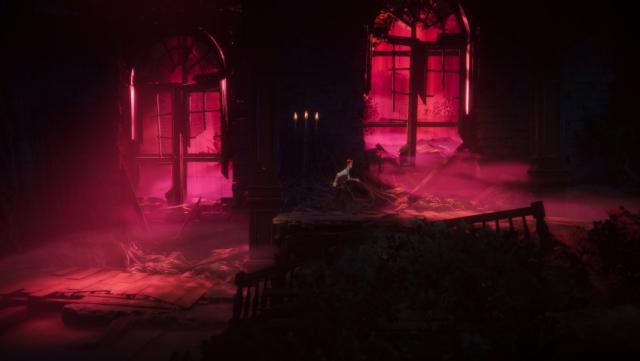
Essentially, fighting is less about joyous experimentation and more about trudging through to reach the good bits. All of those listed frustrations aren't to say it's broken beyond repair. The basic rhythm of dodges, blocks, and melee strikes that also fuels your one-shot pistol is serviceable, but still woefully unpolished. That said, Plot Twist deserves some credit for mitigating enemies' power upon repeat visits (which you’ll certainly do). But only the first time through does beating them net you Ink (in-game currency) for Companion upgrades, so there's a balanced trade-off. I'd still argue that decision should be considered an admission of guilt.
When focusing on exploration, Last Case distills the fundamentals of a Metroidvania. Just as Benedict is building a spider graph for this case (which you can see in every loading screen), so too are players slowly understanding the world's lore and Fox's family history, much of which is hidden behind locks requiring special items. What's arguably its best strength is art design melding with world-building. While James' and Marie's Limbos both have vivid color choices – ranging from blue, deep purple, incarnadine, etc. – with similar enemies, what gives them character are the distinct backgrounds. Both surreal labyrinths have the Fox Mansion incorporated in semi-distorted ways, but each one emphasizes different areas: James has a wing dedicated to his laboratory and library, while Marie has an impressively-furnished wing for the bedroom and loft areas. There are other subtle environmental differences that compliment the repressed memories buried within each psyche.
Despite these levels and the mansion hub feeling so lovingly detailed, they'll eventually lose their luster should you invest into exploring and puzzle-solving. The multitude of brainteasers are wildly varied in kind: monster-mouthed doors, rune-counting locks, tarot card riddles, and more. Add these on top of obstructed areas that require special items tucked away within either Limbo and there's a pertinent question to ask: how much is too much? Part of why that question is so pertinent stems back to special obstructions – be it consuming darkness, monster locks, gooey waterfalls – requiring a unique item that’s set aside like any other collectible. I have a pet peeve against this design; when considering a game with this many secrets, setting guardrails to exploration-expansive items should be the norm. Because of Plot Twist's mindset, going off the golden path eventually becomes more about portal-hopping to the nearest main or side quest than appreciating the world itself. 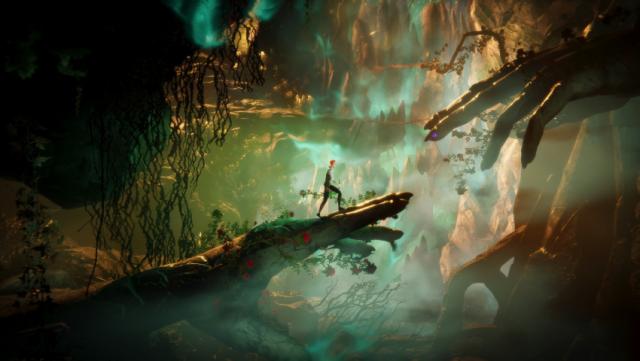
Pouring in more stuff and lacking clear definition also describes Last Case's story. There's this tough balancing act between grander occult conspiracies during The Roaring Twenties while also examining the tragic past of a father (& step-mom) Benedict never knew, neither of which are adequately satisfied.
While there's initial intrigue to this fraught relationship, the ultimate culprits in this case are corny and obvious; worse still, any emotional connection is stultified by taking a backseat to Benedict's current situation with the occult order. Even with so much Lovecraftian lore-dumping, the stakes for certain players just feels too muddled. Thanks to this, the finale ultimately feels like an after-thought. It also doesn't hit a great stride thanks to mixed presentation. Aside from Craig Hustler's imposing voice (complimented by distorted sound mixing), everyone else simply doesn't ring with much emotion. Antonis Skolias' soundtrack captures a nice blend of ambiance and jazzy tunes, which are well-balanced with each environment, but nothing that elevates an action or emotional set piece to new heights.
From a distance, perhaps this doesn't seem too rough for a $25 indie title. If going on a dollar-per-hour assessment, I tend to appreciate titles with high single-digit runtimes on the golden path that can balloon to 20+ for a completionist run (dependent on solving puzzles without help). But that impressive size seems to have stretched this team too thin. Beyond the combat, polish concerns stem to some bugged runic doors on my Version 1.6 playthrough and certain mechanics, like triple-jumping, feeling too unwieldy. These annoyances can sometimes be exacerbated, like when bombastic side-scrolling segments devolve into trial-n-error platforming. All in all, it could've used more time to iron out technical issues.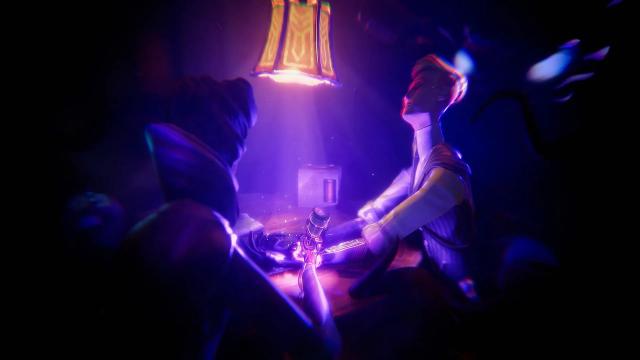
The Last Case of Benedict Fox feels like 2023's definitive example of the precarious balance of a Metroidvania's core tenets, even when a cool premise compliments the genre. Even though Lovecraftian fiction in games isn't breaking new ground, Plot Twist found a niche anyway thanks to some creative ideas and a nuanced human/demon dynamic. But not a single hour went by without me ping-ponging between positive & negative emotions, from beginning to end. It's all the more frustrating to say this since the main fix is about mindset more than anything else, as though another 'developer draft' that respected the team’s limitations would’ve made it soar. Instead, this case feels better left cold.
Contractor by trade and writer by hobby, Lee's obnoxious criticisms have found a way to be featured across several gaming sites: N4G, VGChartz, Gaming Nexus, DarkStation, and TechRaptor! He started gaming in the mid-90s and has had the privilege in playing many games across a plethora of platforms. Reader warning: each click given to his articles only helps to inflate his Texas-sized ego. Proceed with caution.









